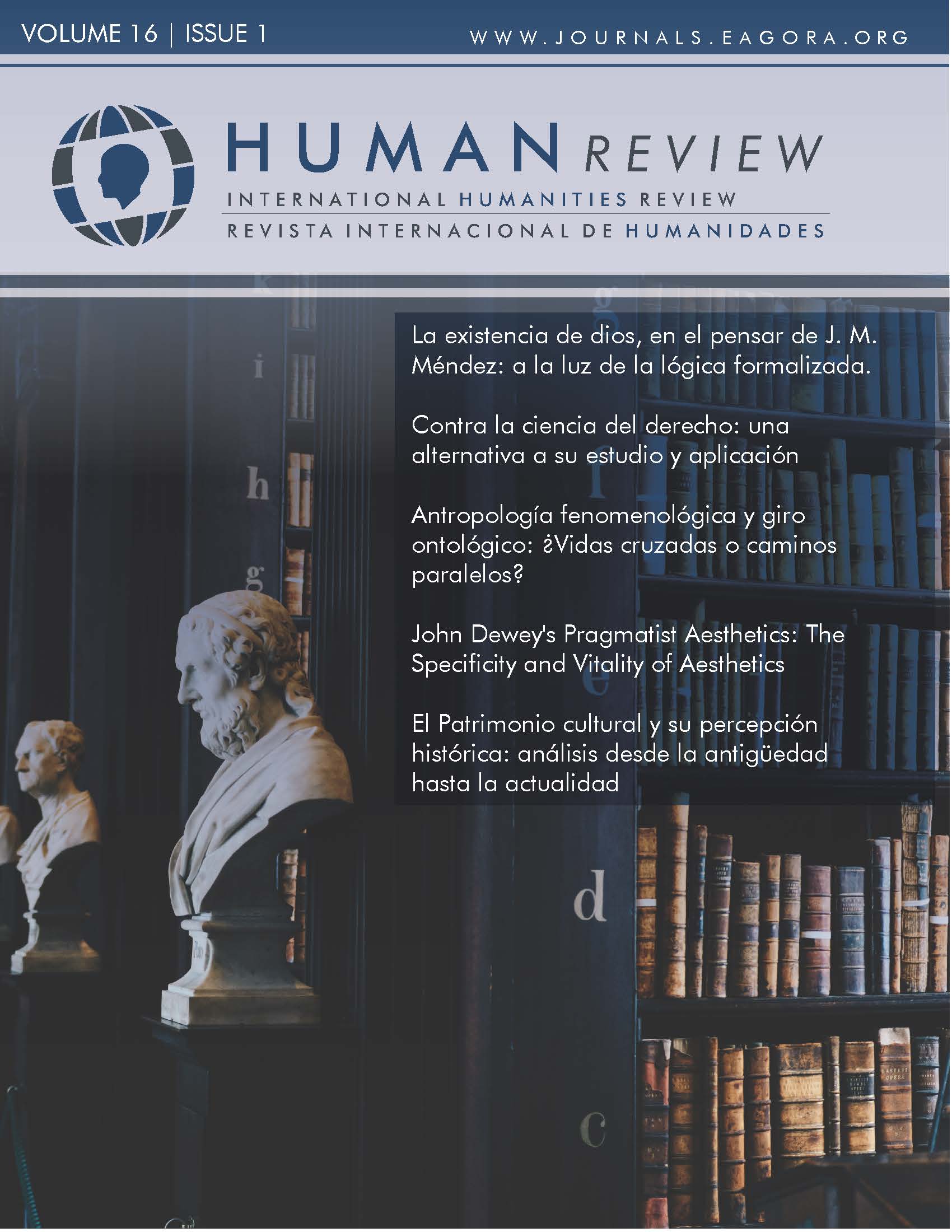The Legal Case Method applied to the film "Judgment at Nuremberg"
DOI:
https://doi.org/10.37467/revhuman.v16.4776Palavras-chave:
Case Method, Ethics, Genocide, Human Rights, Law, EducationResumo
The aim of this paper is to reflect and comment on certain scenes from Stanley Kramer’s film Judgment at Nuremberg based in the Case Method methodology used in university lessons to teach Law and Ethics. The judgement which this film addresses is extraordinary, being one in which judges themselves were judged by other judges; as such, it presents a perfect example through which to think about the social responsibility of the legal profession with respect to the application of Law and what relationship this has to broader moral and ethical considerations of the value of human rights.
Referências
Albar, P. J., Martínez, M. V., López, L., & Pallarès, M. (2022). Cordón de Memoria: la identidad como palabra clave. Educación artística: revista de investigación (EARI), 13, 21-37. https://dx.doi.org/10.7203/eari.13.22950
Arendt, H., (1994). Eichmann in Jerusalem: a report on the banality of evil. Penguin Books.
Atienza, M. (2006). El derecho como argumentación. Ariel.
Bobbio, N. (2005). Justicia, Validez y Eficacia. In Teoría general del derecho, (pp. 33-51). Temis.
Caldera-Ynfante, J. E., & Rosell-Aiquel, R. (2023). What are Fundamentals Rights? A response from Humanist Constitutionalism. HUMAN REVIEW. International Humanities Review, 12(2), 1-18. https://doi.org/10.37467/revhuman.v12.4643
Eisikovits, N. (2014). Transitional Justice. In Edward N. Zalta (Ed.), The Stanford Encyclopedia of Philosophy (First published: Monday January 26, 2009; substantive revision: Fri Apr 4, 2014), [accessed January 30, 2023]. https://stanford.io/3YCSc8A
Fernández-Salinero, S. (2022). Experiencia en torno del dolor y enfermedad en el centro penitenciario de Ocaña. Dolor, enfermedad y la búsqueda de sentido. Bajo Palabra, Revista de Filosofía, 30, 211-224. https://doi.org/10.15366/bp2022.30.011
Finnis, J. (2014). Natural Law Theories. In Edward N. Zalta (Ed.), The Stanford Encyclopedia of Philosophy [Fall 2014 Edition] [accessed December 20, 2022] http://plato.stanford.edu/archives/fall2014/entries/natural-law-theories/
Fonseca Lindez, I., & Miró Colmenárez, P. J. (2022). The instrumentalization of the Law through the use of the Legal domain: A theoretical approach. VISUAL REVIEW. International Visual Culture Review, 9(6), 1-9. https://doi.org/10.37467/revvisual.v9.3757
Fuller, L. L. (1949). The Case of the Speluncean Explorers. Harvard Law Review, 62(4), 616-645.
García Labrador, J. (2022). ¿Y si el infierno somos nosotros? Perspectivas arendtianas sobre el mundo, la inmanencia y la alteridad. Bajo Palabra, Revista de Filosofía, 30, 239-264. https://doi.org/10.15366/bp2022.30.013
González-Fernández, R. (2022). On the negative social effects of exaggerated distrust and paranoid cognition. Cinta De Moebio. Revista De Epistemología De Ciencias Sociales, 75, 159-171. https://cintademoebio.uchile.cl/index.php/CDM/article/view/69573
Grande Yáñez, M. (2021). La mutabilidad del Derecho natural. Bajo Palabra, Revista de Filosofía, 27, 257-272. https://doi.org/10.15366/bp2021.27.013
Gutiérrez, M. P., De la Mata, C., & Álamo, M. (2022). Youtube to spread knowledge sharing in higher education. TECHNO REVIEW. International Technology, Science and Society Review, 12(1), 1-14. https://doi.org/10.37467/revtechno.v11.4390
Hart, H. L. A. (1961). Legal validity and resistance to law. In The Concept of Law. With a Postscript edited by Penelope A. Bulloch and Joseph Raz. Oxford University Press.
Kramer, S. (Director). (1961) Judgement at Nuremberg. [Film] MGM. DVD edition.
Lee Vera, F. (2023). La filosofía ante el marco normativo de la diversidad y la inclusión. Utopía y Praxis Latinoamericana, 28(100), e7537758. http://doi.org/10.5281/zenodo.7537758
Levi, P. (1959). If this is a man. Orion Press.
Luther King, Jr. M. (2008). Letter from Birmingham Jail. In J. Feinberg & J. Coleman, (Eds.), Philosophy of Law (pp. 231-240). Thomson Higher Education, 8th edition.
Machiavelli, N. (1981). The prince. Penguin Books.
Magadán-Díaz, M., & Rivas-García, J. I. (2021). The Use of Audiovisual Resources as a Learning Tool. TECHNO REVIEW. International Technology, Science and Society Review, 10(2), 185-198. https://doi.org/10.37467/gkarevtechno.v10.3118
Manzanero, D. (2022). Krausist’s criticism of the European imperial nationalism doctrine. Human Affairs. A Post disciplinary Journal for Humanities and Social Sciences. Walter de Gruyter GmbH, 32, 39-47. https://doi.org/10.1515/humaff-2022-0004
Martínez Cristóbal, D. (2022). The Administration of justice and the secret of summary before the media. VISUAL REVIEW. International Visual Culture Review / Revista Internacional De Cultura Visual, 9(6), 1-8. https://doi.org/10.37467/revvisual.v9.3763
Montesquieu, Ch. (2002). The spirit of laws. Prometheus Books.
Muñoz Conde, F. & Muñoz Aunión, M. (2003). ¿Vencedores o Vencidos? Tirant Lo Blanch.
Radbruch, G. (1932). Rechtsphilosophie, Leipzig. [Spanish translation of the 1st German edition: Filosofía del Derecho (1944). Editorial Revista de Derecho Privado].
Valdés, C. (2022). Solidaridad en medio de la globalización. Desafíos para un nuevo internacionalismo. Revista de Ciencias Humanas, Teoría Social y Pensamiento Crítico, 15, 92-106. https://orcid.org/0000-0003-4685-4119.
Downloads
Publicado
Como Citar
Edição
Seção
Licença
Os autores/as que publicam nesta revista concordam com os seguintes termos:
- Os autores/as terão os direitos morais do trabalho e cederão para a revista os direitos comerciais.
- Um ano após a sua publicação, a versão do editor estará em acesso aberto no site da editora, mas a revista manterá o copyright da obra.
- No caso dos autores desejarem asignar uma licença aberta Creative Commons (CC), poderão a solicitar escrevendo a publishing@eagora.org.









